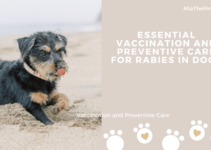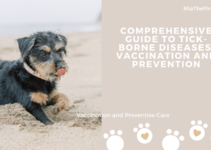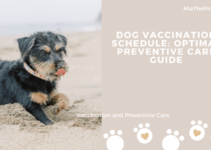Understanding Giardia in Dogs: Vaccination and Preventive Care Explained
Giardia is a common intestinal parasite that can affect dogs of all ages and breeds. It is caused by a microscopic organism called Giardia duodenalis, which resides in the intestines of infected animals. Understanding the impact of Giardia on dogs and taking appropriate preventive measures is crucial for their overall health and well-being.
What is Giardia and how does it affect dogs?
Giardia is a highly contagious parasite that can be transmitted through the ingestion of contaminated water, food, or feces. Once inside a dog’s body, the parasite attaches itself to the lining of the small intestine, causing inflammation and interfering with nutrient absorption. This can lead to symptoms such as diarrhea, vomiting, weight loss, and overall weakness.
Understanding the symptoms and diagnosis of Giardia in dogs
Identifying the symptoms of Giardia in dogs can be challenging as they often overlap with other gastrointestinal issues. Common signs include diarrhea, which may be watery or contain mucus, foul-smelling stools, vomiting, and decreased appetite. To diagnose Giardia, your veterinarian may perform a fecal examination to detect the presence of the parasite or its cysts.
The importance of vaccination against Giardia in dogs
Vaccination plays a vital role in protecting dogs against Giardia infection. While there is no vaccine available that guarantees complete prevention, it can help reduce the severity and duration of the illness. Vaccinating your dog against Giardia is particularly important if they frequently come into contact with other dogs, visit dog parks, or participate in activities where exposure to contaminated environments is likely.
Preventive care measures to minimize the risk of Giardia infection
Preventing Giardia infection in dogs involves implementing certain preventive measures. Firstly, ensure that your dog has access to clean and uncontaminated water sources. Avoid allowing them to drink from stagnant ponds or puddles. Additionally, practice good hygiene by promptly cleaning up your dog’s feces and disposing of it properly. Regularly disinfecting their living areas and bedding can also help minimize the risk of infection.
Treatment options for dogs diagnosed with Giardia
If your dog is diagnosed with Giardia, your veterinarian will prescribe appropriate treatment based on their condition. Treatment usually involves administering oral medications that target the parasite and eliminate it from the dog’s system. It is crucial to follow the prescribed treatment plan diligently and ensure your dog completes the entire course of medication.
Tips for maintaining a Giardia-free environment for your dog
Creating a Giardia-free environment for your dog requires consistent effort. Here are some tips to help you maintain a healthy and parasite-free living space:
- Regularly clean and disinfect your dog’s food and water bowls.
- Wash your hands thoroughly after handling your dog or cleaning up after them.
- Avoid letting your dog interact with known Giardia-infected animals.
- Keep your dog’s living area clean and free from feces.
- Consider using preventive medications recommended by your veterinarian.
By following these preventive measures and staying vigilant about your dog’s health, you can significantly reduce the risk of Giardia infection and ensure their well-being.
FAQs
1. What is Giardia and how does it affect dogs?
Giardia is a highly contagious parasite that can be transmitted through the ingestion of contaminated water, food, or feces. Once inside a dog’s body, the parasite attaches itself to the lining of the small intestine, causing inflammation and interfering with nutrient absorption. This can lead to symptoms such as diarrhea, vomiting, weight loss, and overall weakness.
2. Understanding the symptoms and diagnosis of Giardia in dogs
Identifying the symptoms of Giardia in dogs can be challenging as they often overlap with other gastrointestinal issues. Common signs include diarrhea, which may be watery or contain mucus, foul-smelling stools, vomiting, and decreased appetite. To diagnose Giardia, your veterinarian may perform a fecal examination to detect the presence of the parasite or its cysts.
3. The importance of vaccination against Giardia in dogs
Vaccination plays a vital role in protecting dogs against Giardia infection. While there is no vaccine available that guarantees complete prevention, it can help reduce the severity and duration of the illness. Vaccinating your dog against Giardia is particularly important if they frequently come into contact with other dogs, visit dog parks, or participate in activities where exposure to contaminated environments is likely.
4. Preventive care measures to minimize the risk of Giardia infection
Preventing Giardia infection in dogs involves implementing certain preventive measures. Firstly, ensure that your dog has access to clean and uncontaminated water sources. Avoid allowing them to drink from stagnant ponds or puddles. Additionally, practice good hygiene by promptly cleaning up your dog’s feces and disposing of it properly. Regularly disinfecting their living areas and bedding can also help minimize the risk of infection.
5. Treatment options for dogs diagnosed with Giardia
If your dog is diagnosed with Giardia, your veterinarian will prescribe appropriate treatment based on their condition. Treatment usually involves administering oral medications that target the parasite and eliminate it from the dog’s system. It is crucial to follow the prescribed treatment plan diligently and ensure your dog completes the entire course of medication.



